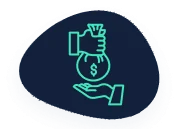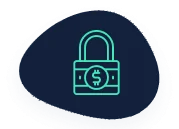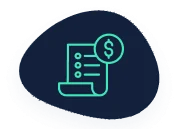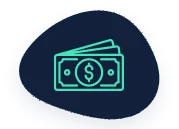A business loan can be a great way to support your business and help it grow and expand to the next level.
However, it’s essential to fully understand the costs before applying for business funding. Taking out a loan can be expensive, and it’s vital that your business can afford the repayments.
We have provided a guide on how lenders calculate the total cost of a loan below, however why not try our free business loan calculator tool.
What are the costs of a business loan?
The total cost of a loan includes much more than just the amount you borrow; it includes interest, fees, and any other charges you may need to pay.
Interest rates
The interest rate is the most significant cost associated with a business loan. It is expressed as a percentage and is what the lender charges you for borrowing the funds.
Business loan interest rate is referred to as the annual percentage rate (APR), and the rate you’ll be charged can vary based on:
- The type of finance
- The amount you want to borrow
- The loan term
- Your business and personal credit score
If you see a representative APR advertised with a loan, it’s important to understand this is not necessarily the rate you will get. It means at least 51% of customers will receive this, or a lower rate.
There are two main types of interest rates available with business loans:
- Fixed interest rates: This type of rate remains the same for the loan term. Your monthly repayments will stay the same regardless of external factors such as base rate fluctuations.
- Variable interest rates: This type of interest rate can go up or down depending on market conditions. It means your repayments could become more expensive or cheaper at any time.
Fees and charges
When you get a business loan, you may be charged additional fees during the loan term. The most common fees associated with business loans include:
- Origination fees: Some lenders charge this fee to process your loan application and set up the loan. They are typically charged as a percentage of the loan amount, e.g. 1 to 3%.
- Early repayment fees: This fee is often applied if you want to repay the loan early. It is designed to reimburse lenders for the interest they would have received if you had continued making your repayments until the end of the loan term. Most of our lender panel do not charge early repayment fees, however, we can run through the T’s and C’s once we have an offer for you.
- Late payment fees: You will be charged this fee if you miss or are late making a repayment. These fees are often fixed, and the amount you are charged will vary from lender to lender.
What influences business loan cost?
Several factors can influence the business loan interest rate you’ll be charged, the fees you pay, and, ultimately, how much you’ll pay overall.
Some of these are within your control; however, there are some external factors that you can’t influence.
Your credit score
When assessing your application, lenders rely heavily on your credit score to determine the potential risk of offering you a loan and to determine the interest rate to charge.
Depending on the size of your business, they can look at both your business credit score and your personal credit score.
A high score illustrates that you have managed credit well in the past and can be considered a low-risk applicant. This means you will be more likely to be accepted for a loan, and it can also lead to lower interest rates and better terms.
A low score shows the lender that you may have had problems with credit in the past or that you don’t have a long credit history. Therefore, some lenders will be reluctant to offer you a loan or will charge higher rates to offset the perceived risk.
Get your free, no
obligation quote Today!
- Apply in minutes
- FREE, no obligation, personalised quote
- FCA regulated
How much do you want to borrow?
Prefer to talk? Call us on
01371 870815
Loan amount and term length
The size of the loan and the time it takes to repay have a significant impact on the total cost.
As interest is charged as a percentage, the more you borrow, the more you will be charged. For example, if you borrow £10,000 over five years at 10% APR, the total interest over the term will be £2,748.26.
If you borrowed £20,000 over the same term and at the same rate, the total interest you would pay would be double – £5,496.52.
Also, the longer you borrow for, the more interest you will pay overall. For example, if you borrowed £10,000 at 10% APR over 10 years, you would pay £5,858.11 in total interest – more than double that if you repaid the loan over five years.
Type of finance
There are a range of ways of borrowing money for your business, and different business loans and finance products have varying costs.
- Secured business loans: Loans secured against business collateral, such as property or equipment, can have lower rates of interest as the lender’s risk is reduced.
- Unsecured business loans: This type of loan doesn’t require collateral, so the lender is exposed to a higher risk. Therefore, they tend to charge a slightly higher interest rate.
- Merchant cash advance (MCA): MCAs are a way of borrowing against future card sales. The cost is usually a fixed fee rather than an interest rate, but the fee can be between 20% – 30% of the amount borrowed.
- Revolving credit facility: This is a line of credit that works like an overdraft or credit card. Interest can be charged daily or monthly, or some lenders charge a fixed fee each time you draw down.
External market conditions
Economic factors outside your control, such as interest rate policies and market trends, also play a significant role.
- Bank of England base rate: The central bank’s interest rate influences lending rates across the market. When the base rate goes up, variable rates will increase, and new fixed-rate products will also go up.
- Inflation: Higher inflation not only drives up interest rates but can also erode the purchasing power of repayments over time, making it harder for businesses to manage debt.
- Economic climate: During periods of uncertainty, such as recessions or geopolitical instability, lenders may tighten borrowing criteria, increase rates, or impose stricter conditions to reduce risk.
How to work out the total cost of your business loan
To understand how much your business loan will cost overall, you need to know:
- The amount you want to borrow
- The term of the loan
- The interest rate
- Any fees you will need to pay
An example
You want to borrow £50,000 over a 6-year term to expand your business operations. The interest rate is 12% APR, and there is an origination fee of £2,500 to pay.
The easiest way to calculate your monthly payments and total interest is to use a business loan calculator. Enter the amount, term, and interest rate, and the calculator will show you your monthly payments and total interest.
In the above example, the monthly repayment will be £1,026.39, and the total interest payable over the loan term will be £23,889.73. Therefore, the total cost will be: Loan amount (£50,500) + total interest (£23,889.73) = £73,889.73. )
Business Loan Calculator
Use our business loan calculator by inputting the loan amount, term and credit profile to get an indicative breakdown of what an offer may look like.
How to reduce the cost of a business loan
There are things you can do to make sure the cost of your business loan is as low as it can be, including:
- Check and improve your credit score: Improving your business credit score can help you access the best possible interest rates. Check your score and take steps to improve it.
- Compare options: Shop around to find the best deal. Aurora Capital compares over 50 commercial lenders to find the right financial solution that fits your business’s needs.
- Only borrow what you need. Don’t be tempted to borrow extra; the more you borrow, the more interest you will pay, and the fees can be bigger too.
- Choose the right loan type: Some loan types are more expensive than others, so make sure you choose the finance option that meets your needs.
- Avoid additional charges: If you break the terms of the loan, such as missing a payment, you will normally be charged an extra fee, so make sure you manage your repayment effectively.









